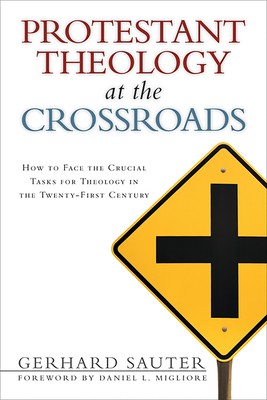
- We will send in 10–14 business days.
- Author: Gerhard Sauter
- Publisher: William B. Eerdmans Publishing Company
- ISBN-10: 0802840345
- ISBN-13: 9780802840349
- Format: 15.4 x 22.7 x 1.4 cm, softcover
- Language: English
- SAVE -10% with code: EXTRA
Reviews
Description
In an atmosphere of growing skepticism and discouragement, what hope has theology for the future, and what sources might deliver that hope? In this astute analysis of Protestant theology today, Gerhard Sauter sets himself to help theology answer critical questions and accomplish crucial tasks in order to move forward with hope.
Protestant Theology at the Crossroads examines contextual theology, in which particular cultural heritages, race and gender, economic conditions, and the structure of social life inform the teachings of the faith rather than vice versa. How, for example, do we approach the crisis in American self-understanding caused by terrorism? Do changes in European politics alter our theological perceptions? Sauter argues that dogmatics -- properly understood as the process of theological reasoning that supports the life of the church -- can and should be used as the tool to save theology. Dogmatics, he says, can break through pious isolationism and converge with genuine public theology, leading to the church's understanding of its own essence.EXTRA 10 % discount with code: EXTRA
The promotion ends in 20d.09:00:47
The discount code is valid when purchasing from 10 €. Discounts do not stack.
- Author: Gerhard Sauter
- Publisher: William B. Eerdmans Publishing Company
- ISBN-10: 0802840345
- ISBN-13: 9780802840349
- Format: 15.4 x 22.7 x 1.4 cm, softcover
- Language: English English
In an atmosphere of growing skepticism and discouragement, what hope has theology for the future, and what sources might deliver that hope? In this astute analysis of Protestant theology today, Gerhard Sauter sets himself to help theology answer critical questions and accomplish crucial tasks in order to move forward with hope.
Protestant Theology at the Crossroads examines contextual theology, in which particular cultural heritages, race and gender, economic conditions, and the structure of social life inform the teachings of the faith rather than vice versa. How, for example, do we approach the crisis in American self-understanding caused by terrorism? Do changes in European politics alter our theological perceptions? Sauter argues that dogmatics -- properly understood as the process of theological reasoning that supports the life of the church -- can and should be used as the tool to save theology. Dogmatics, he says, can break through pious isolationism and converge with genuine public theology, leading to the church's understanding of its own essence.

Reviews